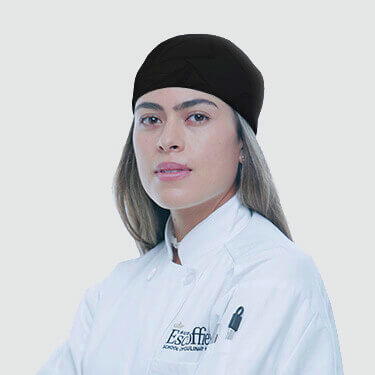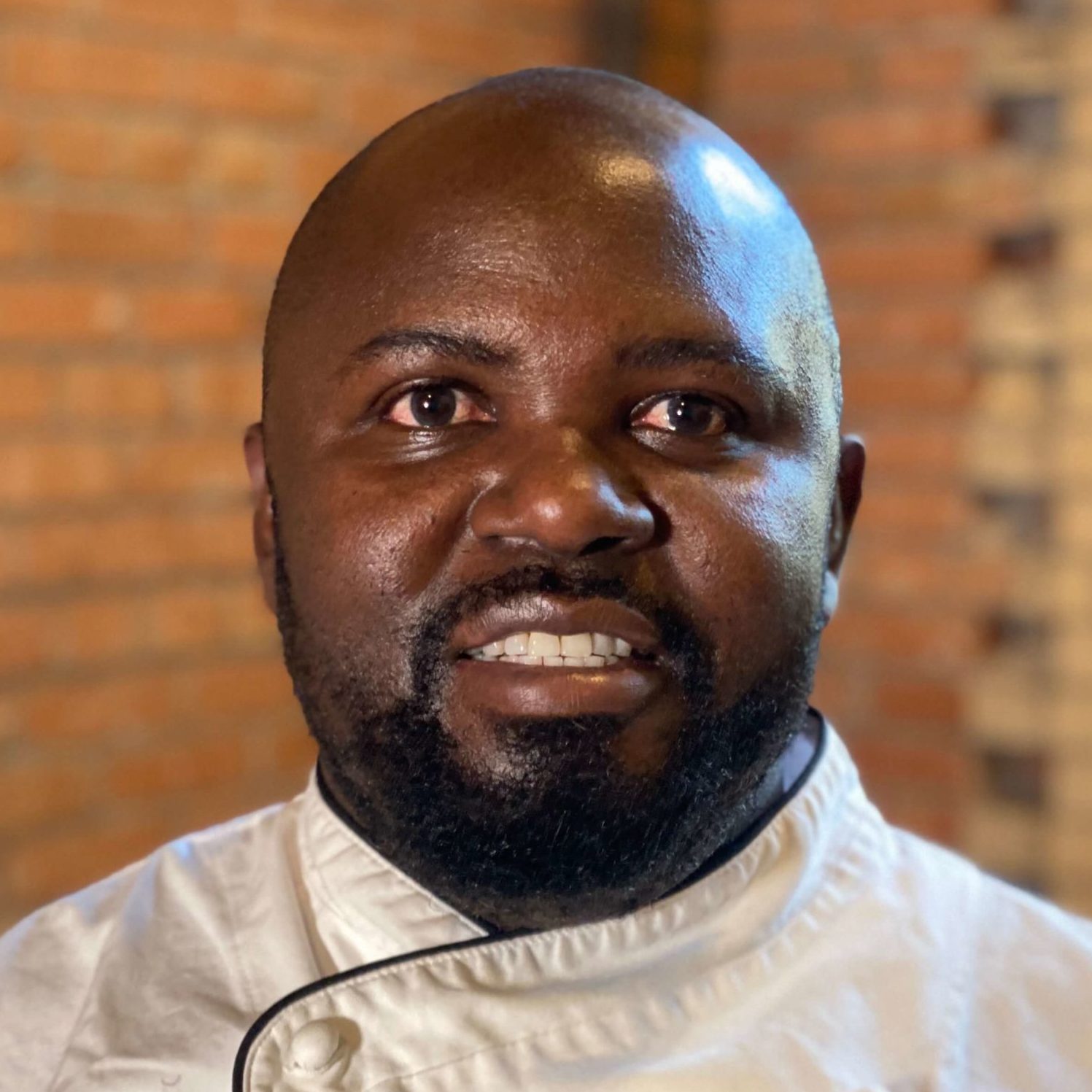No matter where you live, a culinary school education can be possible for you!
Students from countries around the world have attended Auguste Escoffier School of Culinary Arts over the years, either at one of our campus locations or through our online programs.
Choosing to attend school in a different country is a major decision, which can come with some interesting logistics. To clear up any confusion or misconceptions, here’s what you should know about culinary school for international students!
What Can International Students Study at Escoffier?
Escoffier currently offers degrees and/or diplomas in six different disciplines. Whether you’re interested in becoming a cook or a chef, a baker or pastry chef, starting a plant-based restaurant, becoming a health coach, working in restaurant management, or starting your own business, an Escoffier education may be one of the tools that could help you achieve your goals.
Here is a quick look at the six areas of study currently available at Escoffier.
Culinary Arts
Degrees and diplomas in Culinary Arts can help prepare students for a future in food. The curriculum can explore traditional French culinary techniques along with coursework in basic culinary skills, as well as business topics like purchasing and cost control.
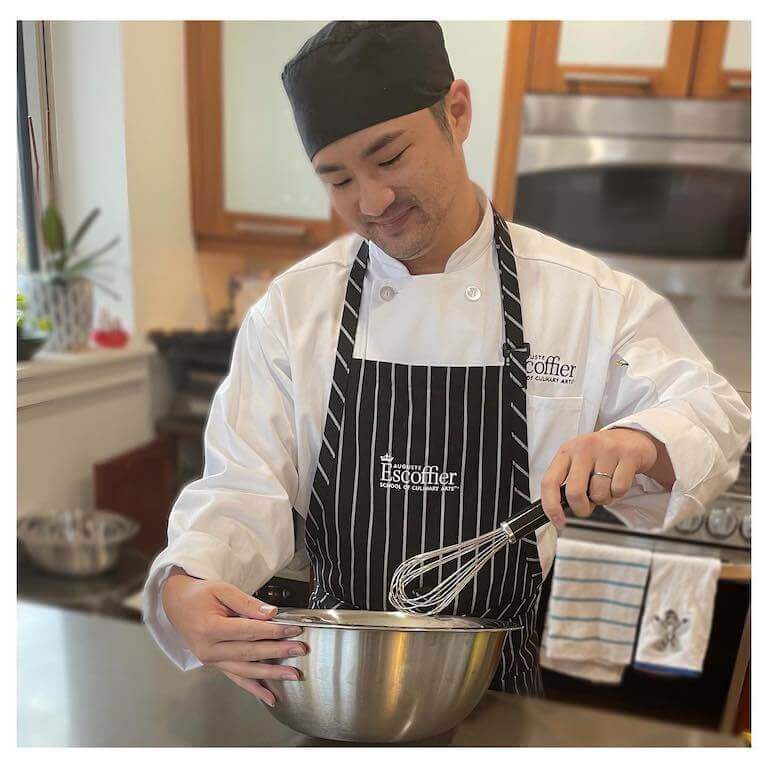
Baking & Pastry graduate Jayse L. performs classwork in their kitchen.
Pastry Arts
Aspiring bakers and pastry chefs can explore artisan breads, cakes, cookies, and desserts of all types with a diploma or degree in Pastry Arts. From the science behind baking to decorating techniques, pastry students take a detail-oriented approach to the foundations of baking and desserts.
Plant-Based Culinary Arts
Cooking goes meat-free with Plant-Based Culinary Arts. These plant-based programs focus on seasonal ingredients, sustainability, and meal composition. Students may also explore substitutions for common animal-based products.
Holistic Nutrition & Wellness
If you dream of a career in the wellness industry, a degree or diploma in Holistic Nutrition and Wellness could be the education you need. With coursework in nutrition, healthy living, mindfulness, and culinary techniques, these programs could prepare a nutrition-focused cook or a future health coach for their career.
Hospitality & Restaurant Operations Management
If you’ve got your sights set on a management role, then an online associate degree in Hospitality & Restaurant Operations Management may help you to get there. This business-focused degree may include coursework in data analytics, guest experience, and employee management to help graduates become more effective leaders in the hospitality industry.

Escoffier’s Hospitality & Restaurant Operations Management programs can help prepare students to be leaders in the industry.
Food Entrepreneurship
If you dream of owning your own food business, a degree or diploma in Food Entrepreneurship might be the right move for you. With courses that may cover foodservice management, marketing, and accounting—along with fundamental culinary principles—Escoffier’s entrepreneurship program can help you develop foundational skills that could propel your career.
How International Students Can Attend Culinary School
At Escoffier, there are two ways for students to study: on-campus, at either our Austin, Texas, or Boulder, Colorado, campuses, or online (via Boulder campus)—from anywhere in the world.
Immersive On-Campus Programs
On-campus students can pursue their studies in either Austin or Boulder—two of the best cities to call home in the United States. Students gather with their fellow learners and Chef Instructors and complete both classroom and kitchen lessons during their time on campus.
Students also have the opportunity to pursue immersive experiences beyond the classroom, such as the Farm To Table® Experience, which gives students the chance to make connections with local farmers and artisans and learn about sustainable, local food production.

On-campus students can explore everything their new home cities have to offer—like the Flatirons, a series of peaks rising above Boulder.
Flexible Online Programs
While studying on-campus can be a good choice for some international students, it’s worth noting that there are additional steps involved in this option—like securing a student visa and relocating to another country. (Don’t worry, though—we’ll walk through those steps in detail in just a moment.)
For international students who want a U.S.-based education without those extra steps, Escoffier Boulder offers online culinary programs that could be the answer. These practical programs include a similar curriculum as on-campus programs but are uniquely tailored to the online platform.
Here’s how online learning works:
At the beginning of each school week, students start with background reading and demonstration videos. Then they attend live video lessons with their Chef Instructors. This is the primary classroom portion of their course, where students get the benefit of their instructors’ expertise and the opportunity to ask questions. Next, students review their cooking assignments and get to work, right in their home kitchens!
Escoffier created an innovative way for students to get feedback from online instruction. Students take photos at preset stages during the recipe process and write a narrative assessing the cooking process and finished dish using a common vocabulary built upon standard industry expectations. Chef Instructors use this information to evaluate student dishes, and provide personalized video feedback with tips for improvement.
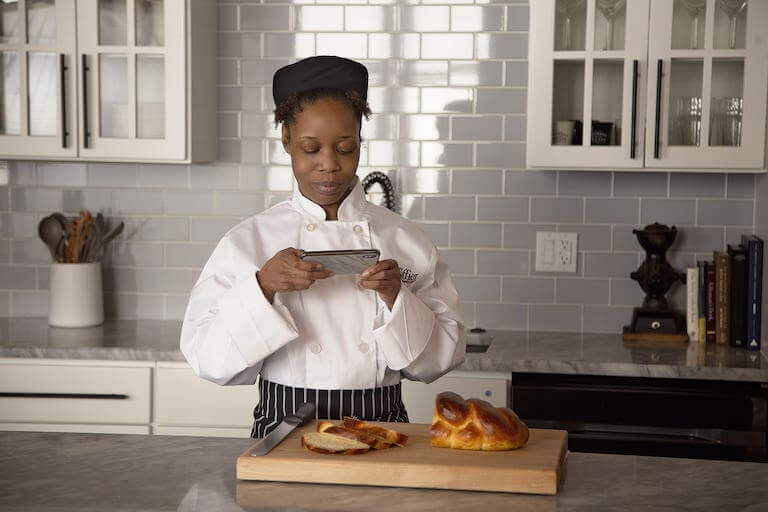
Online culinary students share photos of their work with Chef Instructors, who use them to evaluate student progress and provide personalized feedback.
How Escoffier Supports International Students On-Campus and Online
Regardless of whether you choose to study on campus or online, Escoffier has resources that can help you thrive as you pursue your program.
At the core of all Escoffier programs are our seasoned, passionate Chef Instructors—skilled culinarians who are dedicated to the success of their students. Each Chef Instructor brings their years of experience to both the physical and virtual classroom and is prepared to answer questions, can offer personal guidance, and help students grow.
Escoffier’s admissions representatives are another great resource for international students. Invested in helping students pursue their culinary goals, representatives are capable of guiding you through the application process.
Escoffier can also help international students with career resources as they begin to look beyond graduation. Our Career Services team can help students develop culinary externships—the practical, hands-on experiences in real working kitchens that students must complete as part of their program; the team can also offer coaching, counseling, and other support that can help international students get ready for their dream job.
How Much Does Culinary School Cost for International Students?
At this time, the cost of culinary school at Escoffier is the same for international students and domestic students, ranging from $18,094 to $37,370 for 2023-2024, depending on the program. Tuition rates are subject to change. Check Escoffier’s Tuition & Fees page for up-to-date pricing.
This investment in your education could open doors in the future and help you start your culinary career with good habits and a strong foundation.
However, there are some additional costs that international students must consider if they plan to attend school on-campus. This includes their travel costs, like flights and a passport. They will have to secure housing, which typically includes the cost of an apartment rental. Students online or on-campus must also prove English proficiency, which may require completing a course or taking a formal test—both of which may come with costs.
Further costs are associated with securing a student visa (see How to Apply to Culinary School as an International Student, below).
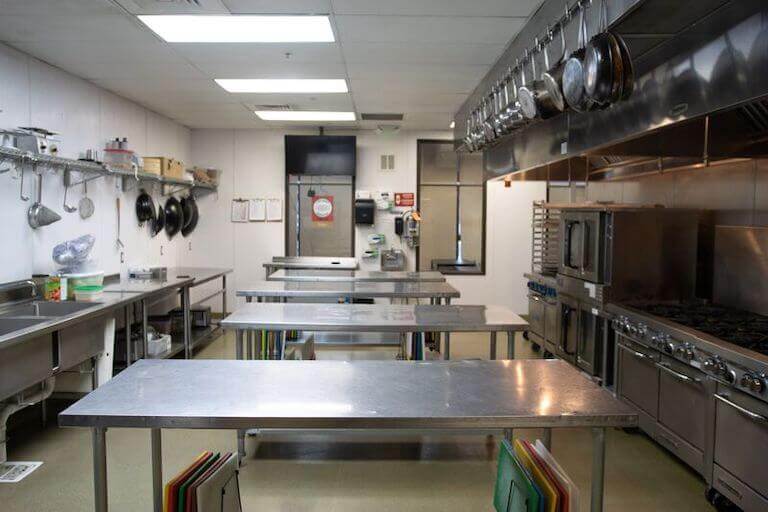
Escoffier’s campuses feature teaching kitchens like this one; online students can prepare food right in their own kitchens.
How to Apply to Culinary School as an International Student
Applying to culinary school as an international student is a multi-step process, due to government regulations and guidelines for non-citizens.
Here is a guide to applying to Escoffier as an international student. Planning to attend online? You only need to complete steps one through three! But if you’re planning to attend in Austin or Boulder, you must complete all eight steps. Keep in mind that visas cannot be issued to students who plan to study online.
1. Apply for Admissions to Auguste Escoffier School of Culinary Arts
The basic application process is the same for international students as domestic students. Once you’ve selected a program and a campus, you can apply for culinary school in just a few minutes.
2. Provide Proof of High School Graduation or Equivalent
All Escoffier students must show proof of high school graduation or an approved equivalent. To make sure your documentation is considered qualified, have your graduation document evaluated for U.S. equivalency by a translation company approved by the National Association of Credential Evaluation Services.
3. Provide Proof of English Proficiency
Escoffier’s courses are taught in English, so students must be able to speak, read, and understand English. There are a number of ways you can demonstrate your proficiency.
- Demonstrate a Common European Framework of Reference for Languages (CEFR) level of B2 or higher
- Complete a Test of English as a Foreign Language (TOEFL) with an Internet-Based Test score of 65 or higher, Paper-Based Test score of 500 or higher, or Computer-Based Test score of 173 or higher
- Complete a test with the International English Language Testing System (IELTS) with a level of 6 or higher
- Earn a Cambridge English: First (FCE) grade of a C or higher or Cambridge English: Advanced (CAE) grade of a CEFR B2 or higher
- Earn a grade of C or better in an intermediate English as a Second Language (ESL) course
- Graduate from an English-speaking secondary institution
- Provide evidence of having completed 8 semester hours or 12 quarter hours with at least a C (70%) average at a United States Department of Education (USDE)-recognized postsecondary institution in which English was the language of instruction.
If you don’t yet have the necessary proof of your English proficiency, you may be able to get “conditional acceptance” to Escoffier. This allows you to start the application process, but you won’t receive final acceptance until you’ve sent your proof of proficiency.
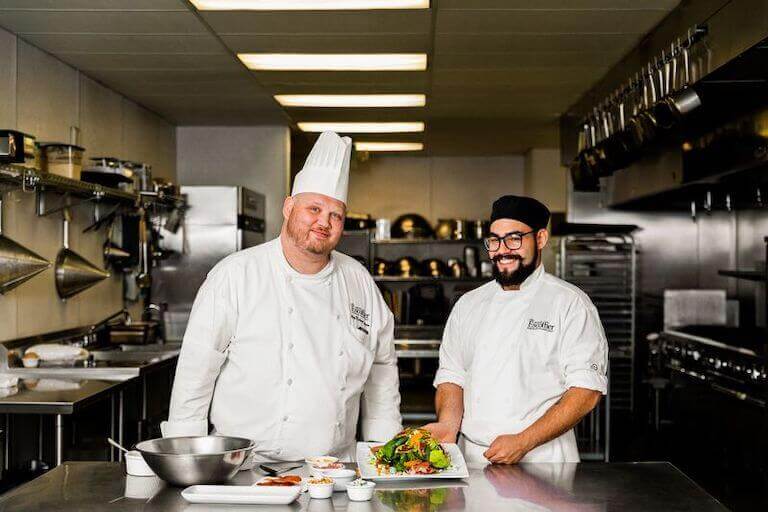
On-campus students work closely with Chef Instructors to hone their skills.
4. Provide Financial Affidavit of Support
In order to receive a student visa (which we’ll discuss in Step 8), prospective international students must show that they have the financial means to live and study in the United States. This is because (as we’ll discuss in Step 8) student visas either don’t allow students to work, or put limits on where and how much they can work during their time in the U.S.
This proof requires a sworn Financial Affidavit of Support and supporting bank statements in U.S. dollars or its local equivalent from within the past six months. The affidavit can be in your own name if you have the funding, or it can be from a family member or sponsor who is willing to support you financially.
5. Provide Additional Documents Required for Transfer Students (If Applicable)
If you’re an international student transferring from another U.S. school to Escoffier, you must provide the following:
- A copy of your current I-20 from your previous school (see step #6)
- A copy of your passport ID page
- A copy of the F-1 student visa page from your passport
- A copy of your I-94 card (which you would have received upon arrival in the United States by the Department of Homeland Security)
- Transfer Verification form (Escoffier can provide a copy of this form, and it must be filled out by the student and their international student advisor at their current school)
- College-level transcripts for possible transfer credits
If you’re not transferring to Escoffier from another U.S.-based institution, you can skip this step!
6. Escoffier Issues Your Form I-20
If you are accepted to Escoffier, you will be issued a Form I-20: Certificate of Eligibility for Nonimmigrant Students. You’ll need this form in order to apply for a student visa to enter the United States.
Form I-20 will include details about your school and program start date. International students can only enter the United States 30 days or less before their program starts.
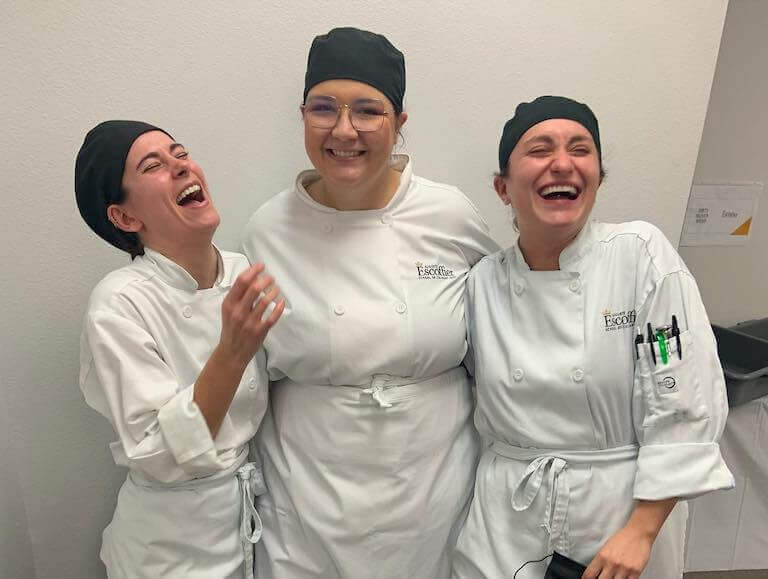
Escoffier students can form lasting personal and professional relationships with their peers.
7. Pay the I-901 SEVIS Fee
The Student Exchange Visitor Information System (SEVIS) is a database that allows the U.S. government to monitor international students in the United States. Students must pay a fee to register with SEVIS. This fee is $350 for most students, as of December 2023.**
This fee can only be paid after you receive your I-20 form from Escoffier, as that document will include the necessary SEVIS ID number.
8. Apply for Your M-1 or F-1 Student Visa in Your Home Country
There are several types of student visas available. At Escoffier, students will need either an M-1 or F-1 student visa. To get a visa, students must apply and complete an interview with the U.S. embassy or consulate in their home country. They must have their Form I-20 at the interview.
M-1 Visas for Austin, Texas or Boulder, Colorado Diploma Students
Diploma students at both Escoffier campuses will need an M-1 visa. This visa allows students to attend school at Escoffier but prohibits students from accepting any paid employment while they are enrolled in school in the United States. They may accept an unpaid position, which will allow them to complete their culinary externships.
After completing their programs, graduates may do up to two months of “practical training,” depending on their program length and location. The rules regarding this training are complex, and it requires the completion of several forms on or before specific deadlines. Get more information about practical training here.
F-1 Visas for Austin, Texas Associate Degree Students
Associate degree students at Escoffier’s Austin campus need an F-1 visa. This visa has specific rules regarding work as well, but they vary based on how far the student has advanced in their program.
It Doesn’t Matter Where You Live!
Wherever you live, your dream of a culinary education can be within reach! Even if traveling to the United States is not an option for you, an online education with Escoffier can allow you to get the same in-depth culinary training from professional Chef Instructors who know the industry inside and out and are prepared to help you take the next step in your culinary career.
If you have additional questions about culinary school for international students, we can help. Contact us to get the information you need to make a smart decision about your future.
TO LEARN MORE ABOUT ATTENDING CULINARY SCHOOL, TRY THESE ARTICLES NEXT:
- From Kenya to Colorado: Chef Arnold Safari on Starting a Restaurant During COVID-19
- Escoffier 101: Everything You Need to Know About Culinary School
- 5 Important Things to Know Before Starting Culinary School
This article was originally published on October 20, 2022, and has since been updated.
*Information may not reflect every student’s experience. Results and outcomes may be based on several factors, such as geographical region or previous experience.
**Tuition rates are subject to change. Check Escoffier’s Tuition & Fees page for up-to-date pricing.

